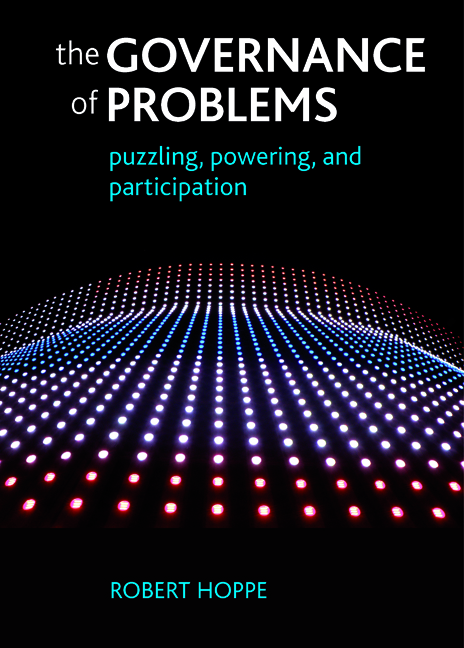Book contents
- Frontmatter
- Dedication
- Contents
- List of boxes, figures and tables
- About the author
- Preface
- one A problem-processing perspective on governance
- two The governance of problems: a map
- three Analysing policy problems: a problem-structuring approach
- four Cultures of public policy problems
- five Problem types and types of policy politics
- six Problem-structuring dynamics and meta-governance
- seven Making policy analysis doable and reflexive
- eight The plural democracies of problems: a meta-theory
- nine Public engagement and deliberative designs
- ten Responsible and hopeful governance of problems
- Bibliography
- Index
three - Analysing policy problems: a problem-structuring approach
Published online by Cambridge University Press: 01 September 2022
- Frontmatter
- Dedication
- Contents
- List of boxes, figures and tables
- About the author
- Preface
- one A problem-processing perspective on governance
- two The governance of problems: a map
- three Analysing policy problems: a problem-structuring approach
- four Cultures of public policy problems
- five Problem types and types of policy politics
- six Problem-structuring dynamics and meta-governance
- seven Making policy analysis doable and reflexive
- eight The plural democracies of problems: a meta-theory
- nine Public engagement and deliberative designs
- ten Responsible and hopeful governance of problems
- Bibliography
- Index
Summary
We do not discover a problem ‘out there’; we make a choice about how we want to formulate a problem. (Lindblom and Cohen, 1979: 50)
Introduction
This chapter introduces the typology of policy problems that underlies the rest of the book. This requires some preliminary conceptual work. Choosing a socialconstructivist approach, the first section develops the perspective of a politics of meaning. It views politics as the collective attempt to control a polity's shared response to the adversities and opportunities of the human condition. The second section gives an overview of how others have approached the social and political analysis of policy issues or problems. Here the proposal is to look at problem structuring as socio-cognitive processes that frame political task environments. From this perspective, four types of policy problems are posited: structured, unstructured and two types of moderately structured problems. The third section discusses properties of structured versus unstructured problems; and analyses how unstructured problems get to be structured through problem decomposition and constraint sequencing. These two processes do not always follow the gradual increase in professional or scientific insight. Frequently, problem decomposition and constraint sequencing follow from critical events, like political decisions, mood swings in public opinion or changes in important markets. Different framings of the HIV/AIDS issue in Europe, the US and South Africa illustrate the concepts introduced in this chapter.
The politics of meaning
A social-constructivist approach
‘What disturbs men's minds is not events but their judgements on events’, wrote Epictetus, a Stoic philosopher (c. 55 – c. 135 E.C.), in his Discourses and Manual (5, trans. Matheson, 1916). This statement is an early precursor of what we now call a constructivist interpretation of reality (for an overview, see Schwandt, 1994). Most of us would agree that knowing and thinking are not passive. Our minds do not merely mirror reality but are actively engaged in creating images of reality. This is amply demonstrated in disciplines as diverse as phenomenology, humanistic hermeneutics, experimental cognitive psychology and neuroscience.
The insight takes on a special meaning for the social sciences, where it is also acknowledged that experiences of reality are in fact social constructions.
- Type
- Chapter
- Information
- The Governance of ProblemsPuzzling, Powering and Participation, pp. 59 - 90Publisher: Bristol University PressPrint publication year: 2010

